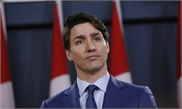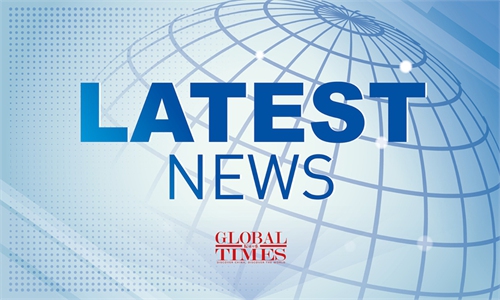
The photo taken on January 8, 2025 shows a view of Montreal, Quebec, Canada. Photo: IC
Editor's Note:
The US' claim that "Canada should join the US as the 51st state" and the potential imposition of 25 percent tariffs by the US on Canada starting February 1 have been among the hot topics recently. In a recent interview with Global Times (GT) reporter Ma Ruiqian, Shaun Narine (Narine), a professor of Political Science Department at St. Thomas University (Canada), shared his views on the recent US-Canada disputes, Canada's strategic autonomy and the irrationalities behind Canada's own tariff policies against China.
GT: As a Canadian, how do you feel about the recent disputes between Canada and the US?
Narine: Obviously, the US doesn't respect Canada. In Canada, Canadians are taking this very seriously. It's insulting and worrying. It's obvious that the US' intention is to steal our resources, take our land and possess the country. Obviously, Canadians are not happy about that, and the government is attempting to coordinate a transnational response to this.
The latest US threat is that there would be a 25 percent tariff against Canada. These tariffs aren't for economic reasons; they are for political ones. All of this shows that the US doesn't respect Canada. This is likely to lead to an economic war between the two countries.
GT: Former US secretary of state Henry Kissinger once said, "It may be dangerous to be America's enemy, but to be America's friend is fatal." In light of Canada's situation, how do you interpret this statement?
Narine: American imperialism is nothing new. The US formed a group of countries around them that benefited enormously from American hegemony and leadership. If you're not part of that club, then you're essentially on the menu. You're potentially a country that can be invaded, interfered with, or otherwise bullied. This applies to most of the Global South.
However, what Canada is discovering now is that the Americans are turning on their allies. They're turning on those countries that have previously been part of their club. Canada is now very much on the receiving end of that.
I do think this will backfire on the US, quite spectacularly. Other countries are going to watch what happens. This situation will seriously affect their understanding of their relationships with the US. I'm particularly curious to see how this plays out in the Asia-Pacific region, especially with AUKUS and the Quad. The Quad is supposed to be organized around the idea of four democratic states supposedly enforcing and preserving international law in the Asia-Pacific. It's going to be difficult to maintain that argument when your biggest member is blatantly violating international law in its own backyard. The hypocrisy surrounding it is going to become overwhelming.
GT: You once wrote in an article that "Canada has fully enlisted as an obedient soldier in the US' cold war against China." How has Canada's strategic autonomy been gradually lost?
Narine: Canada's economic and political dependence on the US - particularly its economic dependence - has always put us in a very bad position with respect to China. The US is terrified of China. It recognizes that China is rising and it's beginning to understand that it cannot stop that rise, despite everything it has tried. As a result, it is becoming more and more hostile toward China. And the US expects its allies to join them in this attempt to contain China.
In Canada's case, while I think it was very short-sighted for the government to essentially sign up for this new American cold war. I also understand why Canadian political leaders may have felt they had very little choice. The more afraid the Americans become of China, the more belligerent they will be toward countries that do not toe their line - countries that do not get on board with their efforts to contain China. Canada's geography and economic situation make it very difficult to turn against the US on an issue that it cares about so much.
Therefore, Canada finds itself in a very awkward position. Now, we're seeing the downside of economic dependence. The Americans are threatening an economic war against us. And where else do we turn? What other options do we have? I would argue that the entire locus of the world economy is shifting to Asia. Canada's second-largest trading partner is China, though still far behind the US. But we should have been reorienting our economy toward Asia decades ago. Instead, we've doubled down on economic dependence on the US, assuming that the Americans wouldn't attack us. Now that we've found that assumption might not be justified, we have very few options left. From our perspective, we either have to fight an economic war or just capitulate.
GT: The Justin Trudeau government imposed tariffs on Chinese electric vehicles (EVs) following the lead of the US. When the US and Canada frequently use tariffs as a tool, what does this behavior demonstrate?
Narine: I think the single biggest factor explaining the tariffs, particularly the tariffs on EVs, comes down to two factors. The first is obviously the US. The Americans had imposed 100 percent tariffs on Chinese EVs, and Canada sees itself as somewhat of a vassal state. Canada didn't feel it could do anything different from what the US was doing on that front, so they were showing their geostrategic loyalty to the US.
The other part behind tariffs is that Canada is protecting its auto industry, directly connected to hundreds of thousands of jobs. However, the general concern with tariffs is that they preserve uncompetitive industries and make consumer prices much higher than they need to be. It's all ridiculous and ultimately folly. Consumers in North America will be forced to buy much more expensive, lower-quality vehicles from companies that cannot compete elsewhere. If you saw the writing on the wall, and realized this, it would have made much more sense to adjust to that reality rather than trying to keep alive an industry that isn't going to be able to survive in the long term.
GT: What lessons can a new Canadian government learn from the foreign policies of the Trudeau administration, particularly in terms of China policy? Are there areas for improvement?
Narine: The smart thing, or at least the obvious thing, for Canada to do is to say it needs to diversify its trading partners so that it can't be economically blackmailed. For decades, Canada has been talking about what's been called the "third option," which is essentially having another economic option and not being so strongly focused on the US. However, that hasn't worked out. If Canada were to say, "We're going to diversify by reaching out to China," it would be very dangerous. The Americans would become hysterical. In many ways, we're stuck.
GT: There has been much discussion across the world about the Global South, believing that the world is moving toward multipolarity. How do you view this change? How should the West perceive this change?
Narine: It's pretty clear that the world is becoming multipolar. There are more centers of power emerging, and the Global South is growing economically, politically and demographically. The locus of the world economy is shifting to Asia, and in some ways, it's already there, so I think countries like Canada and other Western nations need to face reality. The Western world has dominated the planet for at least 200 years, but that was never going to last forever. The idea that a small group of countries could continue to run the world forever is ridiculous.
We're not talking about Western countries being colonized by Asian ones. Western countries need to understand that they now have to make deals and compromise with the rest of the world. There's nothing wrong with that; it's a perfectly reasonable shift. But this shift ties back to what I mentioned earlier about American hegemony. Many countries, including Canada, have benefited significantly from an American-led global order. These countries are now resistant to change. For them, change means giving up a certain amount of certainty, wealth, power, influence, as well as the position they hold in the international system. It's also a challenge outside the experience of policymakers in Canada and the broader Western world. When you're on top of the world, thinking you've got everything under control, it's a shock when you realize that things are changing rapidly. What's even harder is recognizing that your own political and economic systems aren't working as well as they used to. All of this breeds resistance, uncertainty and anxiety. And that's what we're seeing in the Western world right now.



